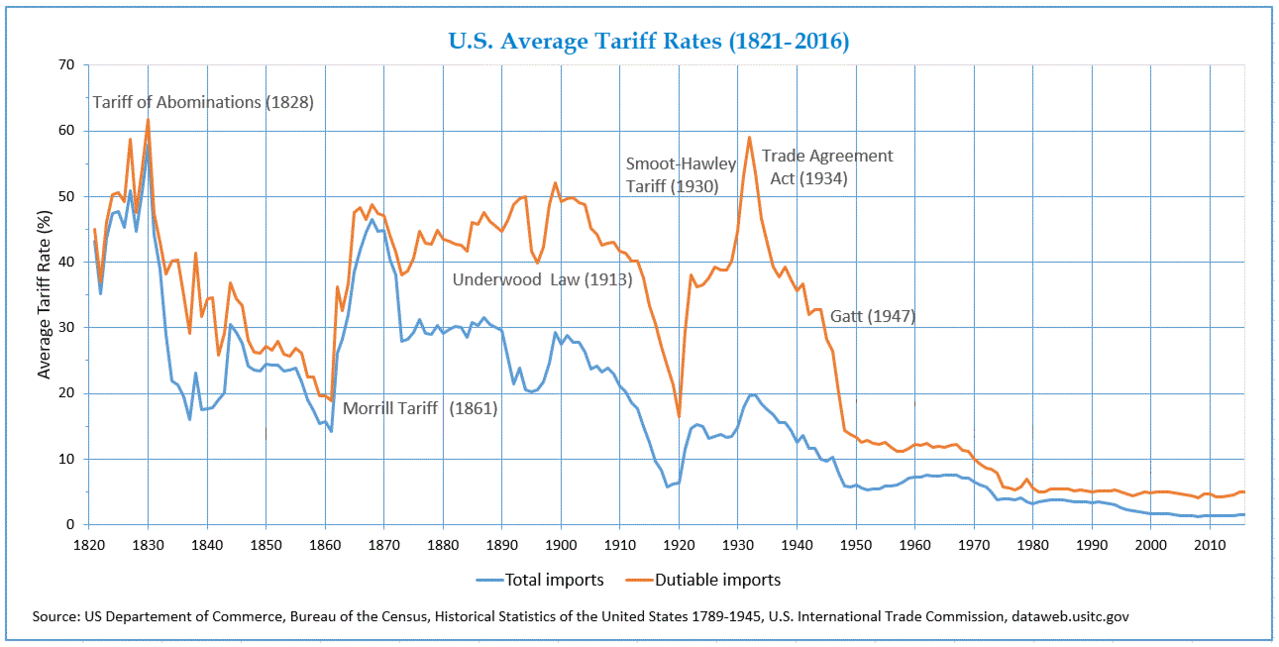What impact do you think it will have on you?
Are there critical items to purchase now that will be too expensive to afford next year?
Are you changing your savings or investments?
I may buy more dried fruit and bulk t-shirts.
My husband finally bit the bullet and upgraded his computer. I’m planning to upgrade my phone before the year is out, because mine is 6 years old and probably not getting security updates for another 4 years.
Not that these things didn’t need to happen, but having it forced on us last minute has sucked.
It will be interesting to see what happens for sure. It’s hard to imagine there will actually be the tariff + removal of income tax proposal that trump said he would do. I’m not sure any democrat will go for it, so Trump won’t be able to do it if there are any republican defectors in congress, and at least some of them prob won’t do it as it they realize it will destroy the pocketbooks of their donors.
If you are an American, how are you preparing for the upcoming tariffs and possible trade war?
I’m not. I would love to, but there’s not really much I can do as far as I can see.
What impact do you think it will have on you?
Are there critical items to purchase now that will be too expensive to afford next year?
Probably a lot of things. Contrary to what a lot of MAGA morons would like to claim, tariffs very rarely ever benefit the country establishing the tariff. Very few things are actually wholly made in America nowadays. With such a global economy, even things that are marketed as “made in America” are typically not made 100% in America. And even if they are, the parts are often sourced from around the world since, with modern shipping, that’s actually cheaper typically than sourcing it in-country. (Not to mention that some parts can’t be sourced in-country simply because no one exists to provide that service anymore.)
Are you changing your savings or investments?
Bold of you to assume that I have any extra money to put into either of those. I put in the same amount of money every week as I have the last while: whatever I can, which isn’t much. I don’t get paid shit for my job, yet prices keep going up. Sadly, it’s not like I have much money to adjust. :(
tariffs very rarely ever benefit the country establishing the tariff.
Well. It depends.
If tariffs are sustained, then it can make sense to establish domestic companies that can supply the goods that were previously being outsourced. In that respect, over the long term–and I’m talking, like 20-30+ years–it could be positive. One of the things that made the US economy strong in the 60s was the fact that we had strong labor, and strong manufacturing; outsourcing our manufacturing has harmed labor and the middle class.
But that’s all very long-term stuff. It’s taken us 40 years to get to where we are now, and bringing manufacturing, and strong unions, back can easily take just as long. In the short term, it’s going to be super-bad for the working poor and the middle class.
over the long term–and I’m talking, like 20-30+ years–it could be positive. One of the things that made the US economy strong in the 60s was the fact that we had strong labor, and strong manufacturing
Looks to me like the strong economy of the 1960s coincided with ending 20-30 years of high tariffs… Sooo…

A lot has changed since the 60s
Absolutely.
But the loss of the manufacturing base, and the subsequent decrease in number of people covered by labor unions, has been one of the single largest factors that’s harmed the middle class. It’s not the only thing, but a manufacturing base ends up being a pretty important part.
Considering using it as an excuse to upgrade my PC to an actual high-end rig to avoid tariffs on PC parts. Never had a PC that was actually “high-end” but this could be an excuse to build one. Aside from that, not much at the moment. There’s too much shit that’ll be affected by tariffs and aside from my PC, I can’t really see myself buying anything new that’ll truly last me four years. As such, there’s not much of a way for me to dodge tariffs.
That’s a good plan if only I had the money spare to do the same rn haha

Somebody should make a website that tracks prices on goods and other items from the day Trump becomes president and throughout his term.
He said he would lower prices. His politics says the opposite. Let’s see.
probably would only work well if backed by a browser extension, camelcamelcamel is nice but IDK what covers local prices for grocery stores.
That’s the Consumer Price Index.
There’s also the related Producer Price Index which unfortunately does not include tariffs but will be interesting to watch.
If you think government metrics during trumps presidency will be accurate, i have a bridge to sell you.
Most .gov websites are essentially useless the moment trump takes the throne.
Funny that you think they’re accurate now. Doesn’t matter WHO is in office, the feds tell you what they want you to hear.
The CPI is a key economic indicator. It’s unlikely that banks and markets would tolerate that kind of meddling.
But, if the CPI was changed for political reasons, there are other similar stats.
In plain language: Wall Street can make or lose billions of dollars based on correctly/incorrectly forecasting this stat, so you can bet your ass they have accurate data. Some of it is private; some is available to paying customers. Even if the data is not public, it is often publicly characterized, for example, in economic forecasts and in publications like The Economist.
Some examples of alternative CPI sources are: PriceStats and The Economist’s Intelligence Unit. Both require paid access.
Be aware that freely-available stats may be published with political agendas, by Fox News conspiracy theorists, etc.
Far better would be something like:
- Go to grocery store
- Photograph the shelves in PriceHive app
- AI scans the images, detecting products and reading prices from the price tags
- Each is stored into a database as a price on a good at a location at a timestamp
After data pool is established from many users (or even just one):
- Go to grocery store
- Open PriceHive app
- Hold a product in the viewfinder
- AI identifies product
- app shows price history across time/locations
That kind of shit needs to be built. Government will probably find some way to make it illegal, but whatever.
Don’t forget the Big Mac index, apropos given the incoming administration.
This should be tracked regardless of who’s in charge
Well, yeah, but he’s made it a big part of his campaign. In reality somebody should make a list of ALL promises they make, and then see who’s trustworthy.
American
savings or investments
I don’t understand
I’m going to be working on only buying domestic goods going forward. Yes, it will increase the cost of goods overall, but that’s a given when we’re going from an unreasonably cheap standard to one built for supporting our own people. I’ve already been careful to mostly focus on domestic produce and goods, all that the tariff package will do is encourage me to continue on that journey.
Oranges grown in Argentina and flown in (with all the damage that planes do) should not be cheaper than those grown in Florida. Mexican chiles should cost more than the ones from New Mexico and Arizona. Coffee from Ethiopia or other places around the world ought to cost more than from Hawaii or elsewhere in the USA. That’s just the plants - never mind the meat, the fish, the dairy, or the hard goods.
I don’t want to buy cheap shirts made in Malaysia or the Philippines. I want to buy good quality clothing from American companies from American retailers on store shelves. I want that to be the standard everyone lives to. Whether we like it or not, tariffs are the only way to change the aggregate behavior. I don’t want half of my stuff to be plastic crap made in China under their torturous labor laws. I want to be surrounded by quality goods made here in the USA by American workers. I entirely support the tariffs and their higher-order effects, even the increased costs. In fact, I think the projected values are too low, because it might still be cheaper to import. We need to enforce tariffs that make it cheaper to produce and build here in the USA, with Americans working to the benefit of Americans.
Getting into the ‘plastic crap’ also, I don’t want America to ‘recycle’ plastic by shipping it abroad and going with the policy that says that if it’s out of sight, it’s out of mind. I want us to actually work to recycle our plastics, to reuse every scrap we can, because it should be cheaper to recycle and reuse domestic product than it is to import new or to export that which should be recycled.
So sure, I expect to see higher costs. I expect that my dollar will be stretched thinner for a time. But if the government stays the course to enforce high tariffs, and then uses the payments from irresponsible companies who import rather than employ Americans to pay off the national debt, we’ll all be better off.
PS - I want export tariffs too, so that it’s more valuable to sell domestic goods to Americans than to market them abroad.
I see where you are coming from, but I think there are better ways to handle those issues than blanket tariffs. For example, you can get clothes from Bangladesh for cheaper than Norway because Bangladesh pays workers much less, (probably) has much lower environmental regulations, and the focus is on price over quality.
Adding a tariff to goods from Bangladesh would not improve the goods, it would just squeeze the business to cut even more corners to remain competitive, and likely put a lot of poor people out of work. Additionally a tariff on goods from a country is likely to be retaliated.
If the end goal is reducing production of garbage products at great impact to the environment and the workers, laws can focus specifically on those factors. We already place antidumping and counterveiling duties on goods that we deem are priced with unfair business practices, why not do more of the same for unfair labor practices, or environmental practices?
If someone can pay Ethiopian farmers a fair wage to produce landrace coffee (where it grows natively), and the environmental costs of shipping it to the US are accounted for, I don’t think it should be arbitrarily upcharged relative to monocrop coffee grown in a narrow band of expensive former rainforest in Hawaii.
Thank you for a respectful and thoughtful reply. I understand your perspective, though we disagree. I just don’t think we’re in a condition as a country where we can really go for the nuanced approach. The country needs to take broad decisive action to bring back American labor and services.
As long as the focus is on price, we need to make the price of importing higher than the cost of domestic production. This isn’t about whether the quality of Norwegian goods or Bangladeshi goods is higher. It doesn’t even matter if American goods are of lower quality than those Bangladeshi ones. It’s about whether it was made in America by American labor, and thus supports an American labor chain. That’s really where my focus is at this point. The environmental concerns are secondary, but important - simply that it takes fuel and money to bring those goods to our shores.
There are unemployed Americans, while goods and services are being imported from abroad. That shouldn’t be considered an acceptable outcome. I don’t particularly care about workers from foreign nations, sad to say. In abstract, yes, I would like for everyone on Earth to have a good job and a good life, but our government (and our people) need to focus on the needs of Americans first.
As far as the difference between natural Ethiopian coffee and monoculture Hawaiian coffee, right now I care whether or not the Ethiopian coffee plantations employ American workers on American soil, paying taxes to us and supporting the businesses within their community. The rest is really just a matter of degree at the moment - optimally we’ll sharply reduce imports for both the social and environmental benefits. We shouldn’t be worrying about whether our companies can pay Ethiopians a fair wage right now - that’s the problem of the Ethiopian government and local Ethiopian companies. We need to worry about the fact that there are Americans not working and not receiving a fair wage. We need to clean up our own house first and shorten our reach, before we can reach back out into the world.
Circling back around to the retaliation, that’s fine by me too. I almost want to see retaliation, actually; it saves us from putting up export tariffs. It’s not a ‘trade war’, it’s the desired outcome, to limit trade outside of the United States. I want it to be expensive for us to export goods, services, and labor. Companies here in the US should focus their production on serving the needs of our own people first.
Given the massive debt we’re running right now, the way I see to do that for the time being is to economically punish behavior we don’t want to receive money, rather than spend money and incentivize what we do want. That gets more money into the government that doesn’t directly come from individual income, property, or sales taxes; the debt can be paid down by irresponsible companies who aren’t willing to adjust to the America first paradigm.
i’m gonna move to china as soon as physically possible
the most expensive item I own is a bicycle and I’ve never had savings. i’m already $30k+ in debt so whatever
Whatever happens happens. Don’t really care that much anymore.
im not, none of that shit is going to happen
Death to America
Business won’t let him do most of that. It was just loud fake superficial concepts of plans . His real task is staying in power. I think our biggest concern now is loss of immigrants.
ETA- i was initially pretty concerned and wanted to really cut back spending and increase savings. We will likely do some of that, but we’re still planning little holiday trips and doing work on the house.
I suspect businesses won’t let him deport immigrants either. They are all employed as cheap laborers.
Yeah, Texas industry has already been mentioning it’s worry for farming, construction, and restaurants.
Wouldn’t you want to do exactly the opposite in the face of really bad inflation?
Spend any extra money on imported goods that are consumable, especially chinese. As that money will quickly be worth less.
I have house projects about to start, so i will be buying stuff for that, but it’s mostly labor. Someone asked what everyone is buying now because it will likely get more expensive. Couldn’t really think of anything.
Yeah, I don’t have a ton of stuff I need either. Only planning on grabbing some non-perishable food stuff that’s imported that we enjoy, and maybe some mid level Chinese electronics that I never got around to buying that will almost certainly be twice as expensive a year from now.
Moved forward large purchases that cannot be delayed 5 years.
I am not changing my investments. My predictions on market impacts tend to be wrong. The stock market and the economy are not the same thing (market can be up during recession).
I am working to get healthier and update vaccinations. I don’t know what is coming but being able to run, climb, and lift are versatile.













